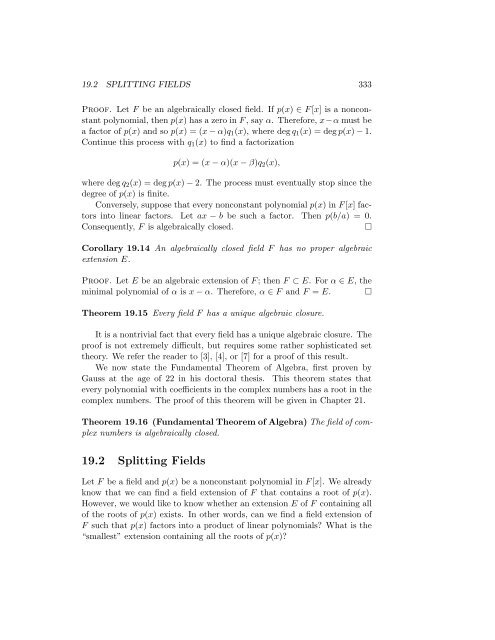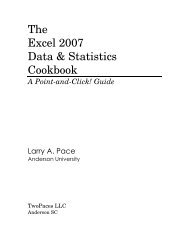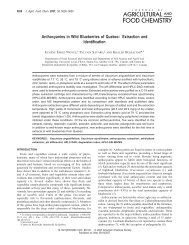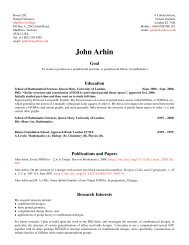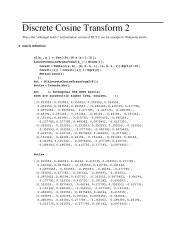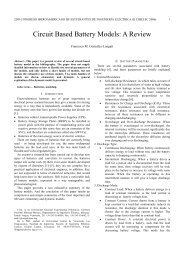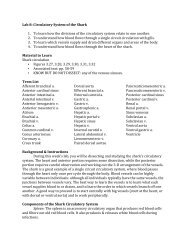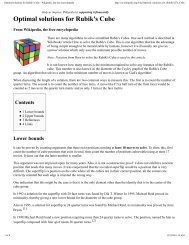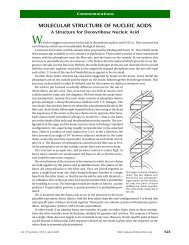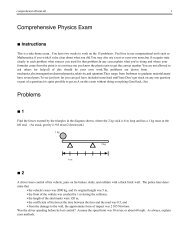- Page 1 and 2:
Abstract AlgebraTheory and Applicat
- Page 3 and 4:
PrefaceThis text is intended for a
- Page 5 and 6:
PREFACEixappears at the end of each
- Page 7 and 8:
CONTENTSxi6 Introduction to Cryptog
- Page 9 and 10:
0PreliminariesA certain amount of m
- Page 11 and 12:
0.1 A SHORT NOTE ON PROOFS 3ax 2 +
- Page 13 and 14:
0.2 SETS AND EQUIVALENCE RELATIONS
- Page 15:
0.2 SETS AND EQUIVALENCE RELATIONS
- Page 18 and 19:
10 CHAPTER 0 PRELIMINARIESnot all f
- Page 20 and 21:
12 CHAPTER 0 PRELIMINARIESThis is a
- Page 22 and 23:
14 CHAPTER 0 PRELIMINARIESgiven by
- Page 24 and 25:
16 CHAPTER 0 PRELIMINARIESandB =the
- Page 26 and 27:
18 CHAPTER 0 PRELIMINARIESIf we con
- Page 28 and 29:
20 CHAPTER 0 PRELIMINARIES(e) If g
- Page 30 and 31:
1The IntegersThe integers are the b
- Page 32 and 33:
24 CHAPTER 1 THE INTEGERSwhere a an
- Page 34 and 35:
26 CHAPTER 1 THE INTEGERSEvery good
- Page 36 and 37:
28 CHAPTER 1 THE INTEGERSThe Euclid
- Page 38 and 39:
30 CHAPTER 1 THE INTEGERSTheorem 1.
- Page 40 and 41:
32 CHAPTER 1 THE INTEGERS9. Use ind
- Page 42 and 43:
34 CHAPTER 1 THE INTEGERSProgrammin
- Page 44 and 45:
36 CHAPTER 2 GROUPSZ n . Consider t
- Page 46 and 47:
38 CHAPTER 2 GROUPSSymmetriesA symm
- Page 48 and 49:
40 CHAPTER 2 GROUPSTable 2.2. Symme
- Page 50 and 51:
42 CHAPTER 2 GROUPSand 4. We define
- Page 52 and 53:
44 CHAPTER 2 GROUPSis the inverse o
- Page 54 and 55:
46 CHAPTER 2 GROUPS1. mg + ng = (m
- Page 56 and 57:
48 CHAPTER 2 GROUPSnecessarily obta
- Page 58 and 59:
50 CHAPTER 2 GROUPS3. Write out Cay
- Page 60 and 61:
52 CHAPTER 2 GROUPS32. Find all the
- Page 62 and 63:
54 CHAPTER 2 GROUPS0 50000 30042 6F
- Page 64 and 65:
3Cyclic GroupsThe groups Z and Z n
- Page 66 and 67:
58 CHAPTER 3 CYCLIC GROUPS✦ ❛
- Page 68 and 69:
60 CHAPTER 3 CYCLIC GROUPS3.2 The G
- Page 70 and 71:
62 CHAPTER 3 CYCLIC GROUPSanda = r
- Page 72 and 73:
64 CHAPTER 3 CYCLIC GROUPSTheorem 3
- Page 74 and 75:
66 CHAPTER 3 CYCLIC GROUPSk multipl
- Page 76 and 77:
68 CHAPTER 3 CYCLIC GROUPS4. Find t
- Page 78 and 79:
70 CHAPTER 3 CYCLIC GROUPS27. If g
- Page 80 and 81:
4Permutation GroupsPermutation grou
- Page 82 and 83:
74 CHAPTER 4 PERMUTATION GROUPSthis
- Page 84 and 85:
76 CHAPTER 4 PERMUTATION GROUPSExam
- Page 86 and 87:
78 CHAPTER 4 PERMUTATION GROUPSExam
- Page 88 and 89:
80 CHAPTER 4 PERMUTATION GROUPSProo
- Page 90 and 91:
82 CHAPTER 4 PERMUTATION GROUPSresu
- Page 92 and 93:
84 CHAPTER 4 PERMUTATION GROUPSand
- Page 94 and 95:
86 CHAPTER 4 PERMUTATION GROUPS(a)
- Page 96 and 97:
88 CHAPTER 4 PERMUTATION GROUPS(b)
- Page 98 and 99:
90 CHAPTER 5 COSETS AND LAGRANGE’
- Page 100 and 101:
92 CHAPTER 5 COSETS AND LAGRANGE’
- Page 102 and 103:
94 CHAPTER 5 COSETS AND LAGRANGE’
- Page 104 and 105:
96 CHAPTER 5 COSETS AND LAGRANGE’
- Page 106 and 107:
98 CHAPTER 6 INTRODUCTION TO CRYPTO
- Page 108 and 109:
100 CHAPTER 6 INTRODUCTION TO CRYPT
- Page 110 and 111:
102 CHAPTER 6 INTRODUCTION TO CRYPT
- Page 112 and 113:
104 CHAPTER 6 INTRODUCTION TO CRYPT
- Page 114 and 115:
106 CHAPTER 6 INTRODUCTION TO CRYPT
- Page 116 and 117:
7Algebraic Coding TheoryCoding theo
- Page 118 and 119:
110 CHAPTER 7 ALGEBRAIC CODING THEO
- Page 120 and 121:
112 CHAPTER 7 ALGEBRAIC CODING THEO
- Page 122 and 123:
114 CHAPTER 7 ALGEBRAIC CODING THEO
- Page 124 and 125:
116 CHAPTER 7 ALGEBRAIC CODING THEO
- Page 126 and 127:
118 CHAPTER 7 ALGEBRAIC CODING THEO
- Page 128 and 129:
120 CHAPTER 7 ALGEBRAIC CODING THEO
- Page 130 and 131:
122 CHAPTER 7 ALGEBRAIC CODING THEO
- Page 132 and 133:
124 CHAPTER 7 ALGEBRAIC CODING THEO
- Page 134 and 135:
126 CHAPTER 7 ALGEBRAIC CODING THEO
- Page 136 and 137:
128 CHAPTER 7 ALGEBRAIC CODING THEO
- Page 138 and 139:
130 CHAPTER 7 ALGEBRAIC CODING THEO
- Page 140 and 141:
132 CHAPTER 7 ALGEBRAIC CODING THEO
- Page 142 and 143:
134 CHAPTER 7 ALGEBRAIC CODING THEO
- Page 144 and 145:
136 CHAPTER 7 ALGEBRAIC CODING THEO
- Page 146 and 147:
8IsomorphismsMany groups may appear
- Page 148 and 149:
140 CHAPTER 8 ISOMORPHISMSab ≠ ba
- Page 150 and 151:
142 CHAPTER 8 ISOMORPHISMSThe addit
- Page 152 and 153:
144 CHAPTER 8 ISOMORPHISMSthat is,
- Page 154 and 155:
146 CHAPTER 8 ISOMORPHISMSTherefore
- Page 156 and 157:
148 CHAPTER 8 ISOMORPHISMSWe will l
- Page 158 and 159:
150 CHAPTER 8 ISOMORPHISMS20. Prove
- Page 160 and 161:
9Homomorphisms and FactorGroupsIf H
- Page 162 and 163:
154 CHAPTER 9 HOMOMORPHISMS AND FAC
- Page 164 and 165:
156 CHAPTER 9 HOMOMORPHISMS AND FAC
- Page 166 and 167:
158 CHAPTER 9 HOMOMORPHISMS AND FAC
- Page 168 and 169:
160 CHAPTER 9 HOMOMORPHISMS AND FAC
- Page 170 and 171:
162 CHAPTER 9 HOMOMORPHISMS AND FAC
- Page 172 and 173:
164 CHAPTER 9 HOMOMORPHISMS AND FAC
- Page 174 and 175:
166 CHAPTER 9 HOMOMORPHISMS AND FAC
- Page 176 and 177:
168 CHAPTER 9 HOMOMORPHISMS AND FAC
- Page 178 and 179:
10Matrix Groups andSymmetryWhen Fel
- Page 180 and 181:
172 CHAPTER 10 MATRIX GROUPS AND SY
- Page 182 and 183:
174 CHAPTER 10 MATRIX GROUPS AND SY
- Page 184 and 185:
176 CHAPTER 10 MATRIX GROUPS AND SY
- Page 186 and 187:
178 CHAPTER 10 MATRIX GROUPS AND SY
- Page 188 and 189:
180 CHAPTER 10 MATRIX GROUPS AND SY
- Page 190 and 191:
182 CHAPTER 10 MATRIX GROUPS AND SY
- Page 192 and 193:
184 CHAPTER 10 MATRIX GROUPS AND SY
- Page 194 and 195:
186 CHAPTER 10 MATRIX GROUPS AND SY
- Page 196 and 197:
188 CHAPTER 10 MATRIX GROUPS AND SY
- Page 198 and 199:
11The Structure of GroupsThe ultima
- Page 200 and 201:
192 CHAPTER 11 THE STRUCTURE OF GRO
- Page 202 and 203:
194 CHAPTER 11 THE STRUCTURE OF GRO
- Page 204 and 205:
196 CHAPTER 11 THE STRUCTURE OF GRO
- Page 206 and 207:
198 CHAPTER 11 THE STRUCTURE OF GRO
- Page 208 and 209:
200 CHAPTER 11 THE STRUCTURE OF GRO
- Page 210 and 211:
202 CHAPTER 11 THE STRUCTURE OF GRO
- Page 212 and 213:
204 CHAPTER 12 GROUP ACTIONSThe ele
- Page 214 and 215:
206 CHAPTER 12 GROUP ACTIONSand the
- Page 216 and 217:
208 CHAPTER 12 GROUP ACTIONSExample
- Page 218 and 219:
210 CHAPTER 12 GROUP ACTIONSLemma 1
- Page 220 and 221:
212 CHAPTER 12 GROUP ACTIONSinduces
- Page 222 and 223:
214 CHAPTER 12 GROUP ACTIONSSwitchi
- Page 224 and 225:
216 CHAPTER 12 GROUP ACTIONSTable 1
- Page 226 and 227:
218 CHAPTER 12 GROUP ACTIONS10. Fin
- Page 228 and 229:
13The Sylow TheoremsWe already know
- Page 230 and 231:
222 CHAPTER 13 THE SYLOW THEOREMSHe
- Page 232 and 233:
224 CHAPTER 13 THE SYLOW THEOREMSpo
- Page 234 and 235:
226 CHAPTER 13 THE SYLOW THEOREMSbe
- Page 236 and 237:
228 CHAPTER 13 THE SYLOW THEOREMSSu
- Page 238 and 239:
230 CHAPTER 13 THE SYLOW THEOREMS(e
- Page 240 and 241:
14RingsUp to this point we have stu
- Page 242 and 243:
234 CHAPTER 14 RINGSExample 3. We c
- Page 244 and 245:
236 CHAPTER 14 RINGS3. (−a)(−b)
- Page 246 and 247:
238 CHAPTER 14 RINGSProposition 14.
- Page 248 and 249:
240 CHAPTER 14 RINGSa ring homomorp
- Page 250 and 251:
242 CHAPTER 14 RINGSTheorem 14.9 Le
- Page 252 and 253:
244 CHAPTER 14 RINGSTheorem 14.15 L
- Page 254 and 255:
246 CHAPTER 14 RINGSthe Senate is n
- Page 256 and 257:
248 CHAPTER 14 RINGShas a solution.
- Page 258 and 259:
250 CHAPTER 14 RINGSMultiplying the
- Page 260 and 261:
252 CHAPTER 14 RINGS11. Prove that
- Page 262 and 263:
254 CHAPTER 14 RINGS34. Let R be a
- Page 264 and 265:
15PolynomialsMost people are fairly
- Page 266 and 267:
258 CHAPTER 15 POLYNOMIALSExample 1
- Page 268 and 269:
260 CHAPTER 15 POLYNOMIALSProof. Su
- Page 270 and 271:
262 CHAPTER 15 POLYNOMIALSm ≥ n.
- Page 272 and 273:
264 CHAPTER 15 POLYNOMIALSPropositi
- Page 274 and 275:
266 CHAPTER 15 POLYNOMIALSProof. Su
- Page 276 and 277:
268 CHAPTER 15 POLYNOMIALSwhere eac
- Page 278 and 279:
270 CHAPTER 15 POLYNOMIALSProof. Su
- Page 280 and 281:
272 CHAPTER 15 POLYNOMIALS(c) p(x)
- Page 282 and 283:
274 CHAPTER 15 POLYNOMIALSAdditiona
- Page 284 and 285:
276 CHAPTER 15 POLYNOMIALS(a) x 4
- Page 286 and 287:
278 CHAPTER 16 INTEGRAL DOMAINSelem
- Page 288 and 289:
280 CHAPTER 16 INTEGRAL DOMAINSIt i
- Page 290 and 291: 282 CHAPTER 16 INTEGRAL DOMAINSLet
- Page 292 and 293: 284 CHAPTER 16 INTEGRAL DOMAINSCons
- Page 294 and 295: 286 CHAPTER 16 INTEGRAL DOMAINSEucl
- Page 296 and 297: 288 CHAPTER 16 INTEGRAL DOMAINSin D
- Page 298 and 299: 290 CHAPTER 16 INTEGRAL DOMAINSCoro
- Page 300 and 301: 292 CHAPTER 16 INTEGRAL DOMAINS7. L
- Page 302 and 303: 17Lattices and BooleanAlgebrasThe a
- Page 304 and 305: 296 CHAPTER 17 LATTICES AND BOOLEAN
- Page 306 and 307: 298 CHAPTER 17 LATTICES AND BOOLEAN
- Page 308 and 309: 300 CHAPTER 17 LATTICES AND BOOLEAN
- Page 310 and 311: 302 CHAPTER 17 LATTICES AND BOOLEAN
- Page 312 and 313: 304 CHAPTER 17 LATTICES AND BOOLEAN
- Page 314 and 315: 306 CHAPTER 17 LATTICES AND BOOLEAN
- Page 316 and 317: 308 CHAPTER 17 LATTICES AND BOOLEAN
- Page 318 and 319: 310 CHAPTER 17 LATTICES AND BOOLEAN
- Page 320 and 321: 18Vector SpacesIn a physical system
- Page 322 and 323: 314 CHAPTER 18 VECTOR SPACES5. −(
- Page 324 and 325: 316 CHAPTER 18 VECTOR SPACESProposi
- Page 326 and 327: 318 CHAPTER 18 VECTOR SPACES3. If S
- Page 328 and 329: 320 CHAPTER 18 VECTOR SPACES(d) Let
- Page 330 and 331: 19FieldsIt is natural to ask whethe
- Page 332 and 333: 324 CHAPTER 19 FIELDS· 0 1 α 1 +
- Page 334 and 335: 326 CHAPTER 19 FIELDSExample 5. We
- Page 336 and 337: 328 CHAPTER 19 FIELDSfor b i and c
- Page 338 and 339: 330 CHAPTER 19 FIELDSLetu = ∑ i,j
- Page 342 and 343: 334 CHAPTER 19 FIELDSLet F be a fie
- Page 344 and 345: 336 CHAPTER 19 FIELDSTheorem 19.19
- Page 346 and 347: 338 CHAPTER 19 FIELDSlength αβ. A
- Page 348 and 349: 340 CHAPTER 19 FIELDSbe the equatio
- Page 350 and 351: 342 CHAPTER 19 FIELDScosine,4α 3
- Page 352 and 353: 344 CHAPTER 19 FIELDS11. Let p(x) b
- Page 354 and 355: 20Finite FieldsFinite fields appear
- Page 356 and 357: 348 CHAPTER 20 FINITE FIELDSextensi
- Page 358 and 359: 350 CHAPTER 20 FINITE FIELDSGF(p 24
- Page 360 and 361: 352 CHAPTER 20 FINITE FIELDSMessage
- Page 362 and 363: 354 CHAPTER 20 FINITE FIELDSThe add
- Page 364 and 365: 356 CHAPTER 20 FINITE FIELDSExample
- Page 366 and 367: 358 CHAPTER 20 FINITE FIELDSand g(x
- Page 368 and 369: 360 CHAPTER 20 FINITE FIELDS(3) ⇒
- Page 370 and 371: 362 CHAPTER 20 FINITE FIELDS22. Sho
- Page 372 and 373: 21Galois TheoryA classic problem of
- Page 374 and 375: 366 CHAPTER 21 GALOIS THEORYthe Gal
- Page 376 and 377: 368 CHAPTER 21 GALOIS THEORYof G(E/
- Page 378 and 379: 370 CHAPTER 21 GALOIS THEORYin K. A
- Page 380 and 381: 372 CHAPTER 21 GALOIS THEORYThe pro
- Page 382 and 383: 374 CHAPTER 21 GALOIS THEORY{id, σ
- Page 384 and 385: 376 CHAPTER 21 GALOIS THEORYThe ker
- Page 386 and 387: 378 CHAPTER 21 GALOIS THEORYfor res
- Page 388 and 389: 380 CHAPTER 21 GALOIS THEORYis a no
- Page 390 and 391:
382 CHAPTER 21 GALOIS THEORYand onc
- Page 392 and 393:
384 CHAPTER 21 GALOIS THEORY(a) x 5
- Page 394 and 395:
386 CHAPTER 21 GALOIS THEORY[3] Fra
- Page 396 and 397:
388 NOTATIONSymbol Description Page
- Page 398 and 399:
390 NOTATIONSymbol Description Page
- Page 400 and 401:
392 HINTS AND SOLUTIONSConversely,
- Page 402 and 403:
394 HINTS AND SOLUTIONS4. (a)(c)( 1
- Page 404 and 405:
396 HINTS AND SOLUTIONS7. (a) (0000
- Page 406 and 407:
398 HINTS AND SOLUTIONS9. For any h
- Page 408 and 409:
400 HINTS AND SOLUTIONS2. The four
- Page 410 and 411:
402 HINTS AND SOLUTIONSChapter 17.
- Page 412 and 413:
404 HINTS AND SOLUTIONSChapter 19.
- Page 414 and 415:
GNU Free Documentation LicenseVersi
- Page 416 and 417:
408 GFDL LICENSEappear in the title
- Page 418 and 419:
410 GFDL LICENSEH. Include an unalt
- Page 420 and 421:
412 GFDL LICENSEply to the other wo
- Page 422 and 423:
IndexG-equivalent, 205G-set, 203nth
- Page 424 and 425:
416 INDEXEquivalence relation, 15Eu
- Page 426 and 427:
418 INDEXKlein, Felix, 46, 170, 245
- Page 428:
420 INDEXnormalizer of, 222proper,


